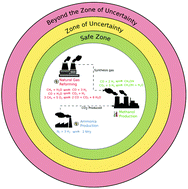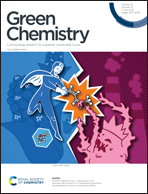Towards greater sustainable development within current Mega-Methanol (MM) production†
Abstract
Supplementing the increasing global methanol demand has forced traditional methanol processing to evolve towards mega-methanol production (MM). With strong legislative change supporting greater adherence to environmental quality, global producers will need to consider a more sustainable process design. Therefore, the need exists to identify viable pathways for the transition of the global methanol industry towards greater sustainability, utilizing existing infrastructure. Here we present a critical assessment of viable MM routes using steam reforming (SMR), combined reforming (CMR) and auto-thermal reforming (ATR), through techno-economics with insight into environmental and global impacts. Our results highlight ATR and CMR as more energy efficient designs, promoting greater environmental benefits. Economically, ATR cases benefit from smaller reforming capacities, providing a cheaper alternative over CMR and SMR designs. Utilization of a Planetary Boundary Framework (PB-LCIA) showed MM technologies transgress PBs affiliated with climate change and ocean acidification. Furthermore, these impacts worsen with increased methanol production, illustrating energy efficiency as a key performance indicator (KPI) that should strongly be considered during process optimization. Additionally, results emphasize industrial symbiosis as a solution to lowering environmental burden. Ultimately, decarbonization coupled with CO2 utilization provides a viable pathway to the absolute sustainability of the MM process across all sustainability domains- with ATR emerging as the best performing technology. Thus, these results highlight critical energy considerations and environmental benefits, underpinning the global MM industry decision on potential sustainable development strategies.



 Please wait while we load your content...
Please wait while we load your content...